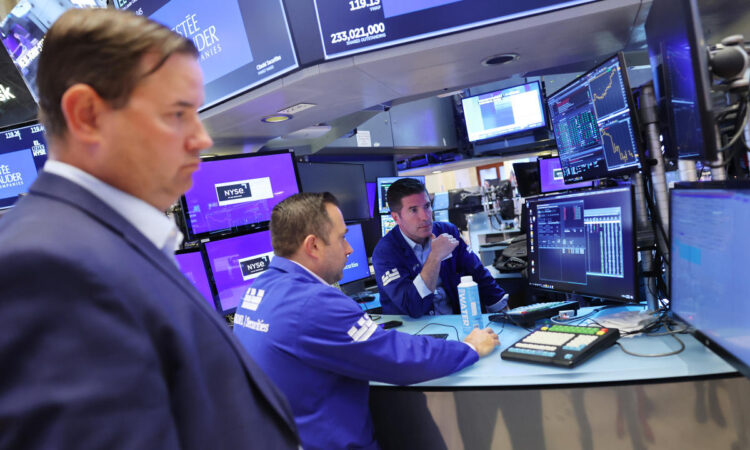
(Bloomberg) — The stock market is ending the week on a sour note after disappointing US economic data, with traders also shunning riskier assets amid worries that a political crisis in France is deepening.
Most Read from Bloomberg
US equities trimmed this week’s rally as a gauge of consumer sentiment unexpectedly fell to a seven-month low as high prices continued to take a toll on views of personal finances. While the market continued to price in about two rate cuts this year, Federal Reserve Bank of Cleveland President Loretta Mester said she would like to see a few more months of good inflation data before considering easing policy.
“While we on Wall Street obsess about the inflation rate of change, many consumers could care less and are still struggling with the cumulative rise relative to their wage growth,” said Peter Boockvar the Boock Report. “The bottom line is simply the inflation squeeze that lower and middle income consumers are feeling.”
ECB Officials See No Cause for Alarm Over French Market Turmoil
Traders rushed to the safest corners on the market on Friday, with French shares this week losing roughly $200 billion in market capitalization — about the size of Greece’s economy — following President Emmanuel Macron’s decision to call a snap election. The nation’s bonds were at the heart of the rout, with the premium that investors demand to own 10-year debt over safer German peers heading for the biggest weekly surge on record.
“The situation in Europe is starting to get a little dicey,” said Matt Maley at Miller Tabak + Co. “The move is still a long way from developing into another sovereign debt crisis, but with concerns about sky-high sovereign debt levels and bloated budgets, the developments in Europe (and particularly France) are raising some concerns in the marketplace.”
The S&P 500 dropped to around 5,420. The Stoxx Europe 600 fell 1.1%. France’s CAC 40 Index extended losses to over 6% on the week, heading for its biggest slide in the span since March 2022. The slump put the nation at risk of losing its crown as the largest equity market in Europe.
Treasury 10-year yields declined three basis points to 4.21%. The dollar headed toward its highest since November. The euro is the worst-performing major currency this week against the greenback.
European Central Bank officials see no cause for alarm in the market turbulence that has engulfed France in the past few days, according to people with knowledge of the matter. A spokesperson for the ECB declined to comment.
Trader anxiety grew after a coalition of France’s left-wing parties presented a manifesto to pick apart most of President Emmanuel Macron’s seven years of economic reforms and set the country on a collision course with the European Union over fiscal policy.
“Given the relevance of the French economy to the EU as well as flashbacks to Brexit, we’re sympathetic to the flight-to-quality and the fact that one would need to seriously consider the longer-term prospects for the EU in the event that France follows the UK and leaves the building, as it were,” said Ian Lyngen and Vail Hartman at BMO Capital Markets.
To Thierry Wizman at Macquarie Group, France is moving toward one of two extreme political scenarios.
“Neither of assemblage is dedicated to pro-market principles, nor fiscal responsibility, nor, possibly the single currency.”
Transactions of more than $1 million among the dollar-denominated bonds of major French banks have proliferated in recent days and are now much more frequent than large-ticket trades in their euro-area peers, based on Trace data compiled by Bloomberg. That’s hit the debt of major lenders like BNP Paribas SA and Credit Agricole SA.
Corporate Highlights:
-
The Federal Aviation Administration is probing how titanium with potentially falsified records made its way from an obscure Chinese producer onto commercial jets manufactured by Airbus SE and Boeing Co.
-
Tesla Inc. investors re-approved Elon Musk’s compensation and cleared the company moving its legal home to Texas, offering votes of confidence in the chief executive.
-
Adobe Inc. projected strong future sales for its creative products, suggesting customers are adopting the company’s new artificial intelligence-based tools.
-
Furniture retailer RH reported a heavier-than-expected first-quarter loss.
-
California’s biggest utility sees power demand doubling by 2040, driven by artificial intelligence, electric cars and other efforts to electrify more of the economy, according to PG&E Corp.’s top executive.
Some of the main moves in markets:
Stocks
-
The S&P 500 fell 0.3% as of 10:54 a.m. New York time
-
The Nasdaq 100 rose 0.2%
-
The Dow Jones Industrial Average fell 0.6%
-
The Stoxx Europe 600 fell 1.1%
-
The MSCI World Index fell 0.6%
Currencies
-
The Bloomberg Dollar Spot Index rose 0.3%
-
The euro fell 0.5% to $1.0684
-
The British pound fell 0.7% to $1.2667
-
The Japanese yen fell 0.3% to 157.46 per dollar
Cryptocurrencies
-
Bitcoin rose 0.4% to $66,948.02
-
Ether rose 0.4% to $3,489.71
Bonds
-
The yield on 10-year Treasuries declined three basis points to 4.21%
-
Germany’s 10-year yield declined 11 basis points to 2.36%
-
Britain’s 10-year yield declined six basis points to 4.06%
Commodities
-
West Texas Intermediate crude was little changed
-
Spot gold rose 1.1% to $2,328.95 an ounce
This story was produced with the assistance of Bloomberg Automation.
–With assistance from Andre Janse van Vuuren, Macarena Muñoz, Jan-Patrick Barnert, Alice Gledhill, Sagarika Jaisinghani and Tasos Vossos.
Most Read from Bloomberg Businessweek
©2024 Bloomberg L.P.






